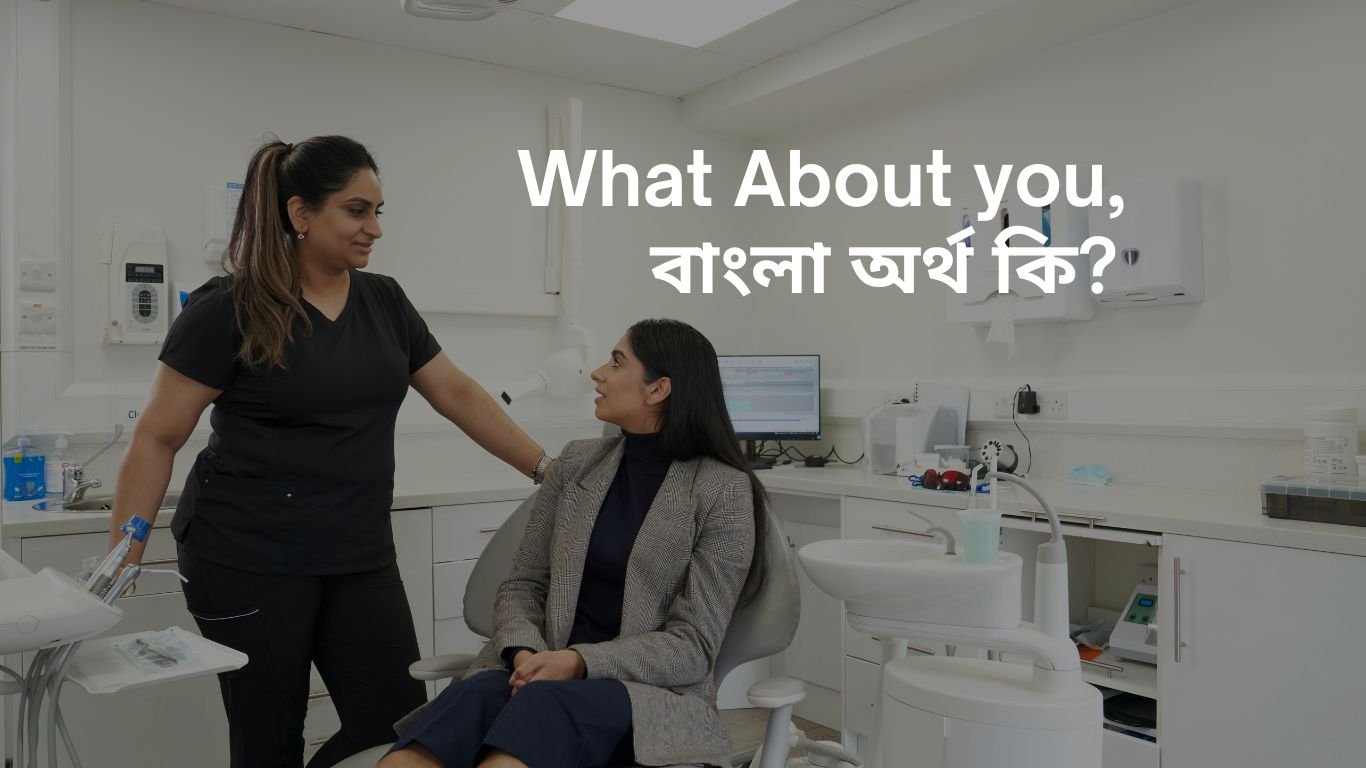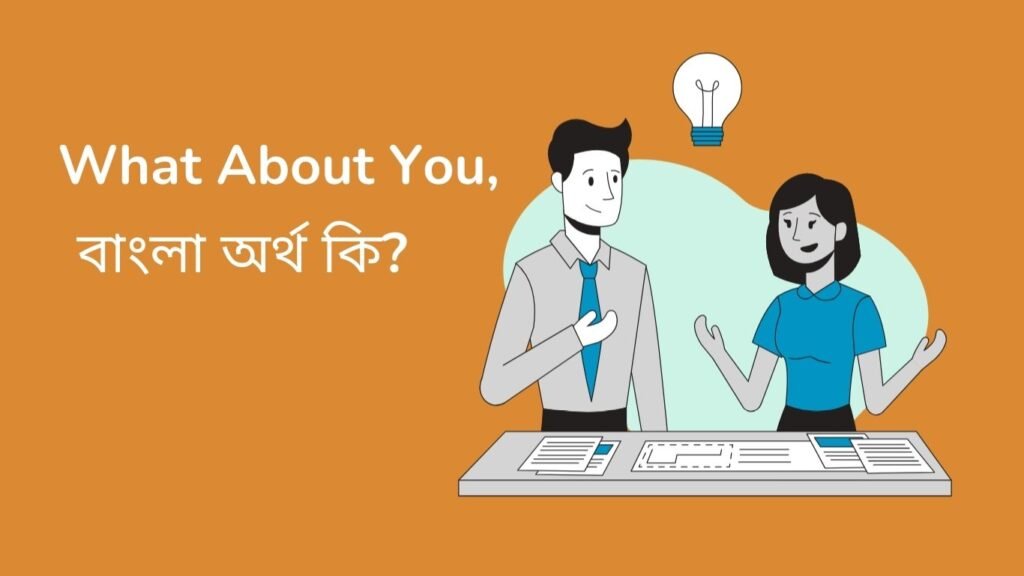
What about you meaning in Bengali | বাংলা অর্থ কি?
Have you ever found yourself in a conversation, keen to know the opinion or status of the person you’re talking to? The English language has just the perfect phrase for it: “What about you?” What is the meaning of the sentence? Let’s have a look at a step-by-step explanation of what about you meaning in Bengali.
প্রত্যেকটি মানুষের জীবনে একটি প্রশ্ন সবচেয়ে বেশি শোনা যায়, সেটি হলো: What about you meaning in Bengali “তোমার কেমন অবস্থা?” এই প্রশ্নটি অত্যন্ত সাধারণ মনে হতে পারে, কিন্তু এর আভ্যন্তরীণ অর্থ গভীর। তাই, আমরা এই বিষয়ে কিছু জানতে চাইলেই এই ব্লগ পোস্টে চোখ বোলিয়ে দেখতে থাকি।

What about you meaning in Bengali: বিস্তারিত বাংলা ব্যাখ্যা
প্রথমেই বলতে হবে, যখন কেউ তোমাকে জিজ্ঞাসা করে, What about you? এর অর্থ হল “তোমার কেমন অবস্থা?” তখন সে কেবল তোমার শারীরিক অবস্থা জানতে চাচ্ছে না, তার মানসিক অবস্থা সম্পর্কেও জানতে চাচ্ছে। কিন্তু স্বাভাবিক ভাবে বেশিরভাগ মানুষ ” তোমার খবর কি ” এমন অর্থ ই বুঝে থাকে |
এখানে কিছু ট্রান্সিশন করলে, আমরা দেখতে পাই এই প্রশ্নটি (What about you meaning in Bengali) সমাজের সাথে যোগাযোগ স্থাপন করার একটি উপায়। বাক্যটি ছোট, কিন্তু গভীর সম্পর্কের প্রতীক।
আমাদের ব্যস্ত জীবনে, অনেকে আমাদের সত্যিকারের অবস্থা বা আবেগ লুকিয়ে রাখতে চাই। কিন্তু, এই প্রশ্নের মাধ্যমে আমরা অন্যের প্রতি আমাদের অবস্থার প্রকাশ করতে পারি, যা আমাদের অন্তরের অনুভুতি ও ভাবনা শেয়ার করতে সাহায্য করে।
আরও একটি গুরুত্বপূর্ণ বিষয় হলো, এই প্রশ্নের জবাব সত্যিকারের ভাবে দেওয়া। অনেক সময়, আমরা সহজ উত্তর “আমি ভাল আছি” দিয়ে যেতে পারি। কিন্তু, তা সত্যি হলেও? আমাদের প্রয়োজন অন্যদের সাথে যথাসত্য ভাবে যোগাযোগ করা।
অবশেষে, “তোমার কেমন অবস্থা?” এই প্রশ্নটি কেবল সাধারণ প্রশ্ন নয়, এটি একটি সম্পর্কের প্রতীক ও আমাদের জীবনের ভেতরের বিস্তার প্রতীক। তাই, যখন পরবর্তীবার কেউ আপনাকে এই প্রশ্ন করে (What about you?), আপনি সত্যিকারের অবস্থা প্রকাশ করে দিন এবং সেই সম্পর্কের ভেতরের গভীরতা অনুভব করুন।
Let’s see What about you meaning in Bengali in Dictionary and Grammar explanation.
“What About You? Bangla Meaning” – A Simple Phrase with a Deep Meaning
This seemingly straightforward phrase can be a game-changer in how we connect with others. Today, we dive deep into its meaning, its place in grammar, and how to use it correctly. Plus, for our Bangla-speaking friends, we’ve got you covered too! “What about you meaning in Bengali”
The Bangla Connection : What about you meaning in Bengali
For those curious about the Bangla translation of “What about you?”, Meaning in Bengali “তুমি কেমন আছ?” (pronounced “Tumi kemon acho?”). The translation literally means “How are you?”, but in many contexts, it can be used to mirror the English sentiment of “What about you?” It’s a phrase that builds bridges across languages, emphasizing that, at our core, we all want to know and understand each other better.
Diving into Grammar: What about you meaning in Bengali
Grammar plays a significant role in how we understand and interpret “What about you?”. At its essence, the sentence is a shortened version of a longer question. For example, if someone says, “I like coffee,” he can ask you with “What about you?” which is a shorter way of asking, “What do you like?”
- Subject: The subject is implied. It’s the person you’re speaking to, often indicated by a nod or gesture.
- Verb: There isn’t an active verb present, but the implied verb could be any action previously mentioned in the conversation, like “do”, “like”, or “think”.
- Object: The “you” in the sentence is the object, referring again to the person you’re speaking to.
Using “What About You?” Correctly for Bangla meaning
The beauty of “What about you?” is its versatility. Here are a few situations in which you might use it:
- Getting Opinions: If you’re discussing movies and say, “I loved that latest superhero movie. What about you?” you’re asking the other person for their opinion on the same topic.
- Checking Feelings: After expressing how you feel, for example, “I’m really tired today,” following up with “What about you?” invites the other person to share their feelings too.
- Making Plans: When coordinating plans, you might say, “I’m free on Saturday. What about you?” This checks the other person’s availability.
When Not to Use “What About You?”
While “What about you?” is undeniably useful, there are times when it might not be the best choice. In formal settings or written English, you might want to opt for a full sentence for clarity. For instance, “What is your opinion on this matter?” sounds more polished in a business meeting than “I think it’s a good idea. What about you?”
Additionally, if the topic is sensitive or personal, jumping in with “What about you?” might come off as too direct or nosy. In these cases, it’s best to let the other person share at their own comfort level.
Closing Thoughts for What about you meaning in Bengali
Language is a beautiful tool for connection. The phrase “What about you?” is a testament to how even the simplest of sentences can hold profound meanings. Whether you’re speaking English or Bangla, this phrase opens doors to deeper conversations, shared opinions, and mutual understanding.
Remember, while it’s a fantastic tool to have in your communication arsenal, it’s also essential to gauge when to use it. After all, effective communication isn’t just about talking; it’s about listening and understanding the right moment to ask, “What about you?”
Certainly! For those who aren’t familiar, IELTS Life Skills is a test of speaking and listening, About yourself: IELTS life skill question and answer idea available at CEFR Levels A1, A2, and B1. It’s used mainly for UK visa and immigration purposes.
How you can use it in IELTS life skills A1 test preparation
1- Level A1 – Question and Answer
1- What’s your name?
You can say: My name is [Your Name].
2-How old are you?
Answer : I am [Your Age] years old.
3- Tell me about your family.
I live with my father, mother, and a younger brother. My father’s name is [Father’s Name], and my mother’s name is [Mother’s Name].
4- What do you do?
I work in a shop. OR I am a student.
5- Where did you study?
I studied at [School/College Name] in [City/Town].
6- Tell me about yourself.
Answer Idea: My name is [Your Name]. I’m from [Your City/Country]. I am [age] years old. I like to [a simple hobby, e.g., “watch movies”].
7- Tell me about your family.
Answer Idea:I have a small family. My father’s name is Raj, and he is a teacher. My mother’s name is Priya, and she is a nurse. I also have a younger sister named Aisha, who goes to school. We all live together in Delhi.
2- Level A2 – About yourself: IELTS life skill question and answer idea
1- Tell me about yourself.
Answer Idea: My name is [Your Name], and I’m [age] years old. I come from [Your City/Country], and I’ve lived there all my life. I work as a [Your Job, e.g., “shop assistant”] and in my free time, I enjoy [a hobby, e.g., “reading books and listening to music”].
4-What’s your favourite colour?
Answer: My favourite colour is blue. I find it calming and it reminds me of the sky and the ocean.
5-Which is your favourite book?
Answer: My favourite book is “To Kill a Mockingbird” by Harper Lee. The story is powerful and the characters are so well-developed.
6-What’s your favourite movie?
Answer: I absolutely love “The Shawshank Redemption”. The plot is captivating and the performances by the actors are top-notch.
7-Who’s your favourite musician or band?
Answer: I’ve always been a big fan of The Beatles. Their music is timeless and has influenced so many artists.
8-Which season is your favourite?
Answer: I adore autumn. The colours of the leaves and the cool weather make it such a delightful time of year.
9-What’s your favourite cuisine or type of food?
Answer: Italian cuisine is my favourite. I can never resist a good pasta dish or pizza.
10-Which place is your favourite to visit?
Answer: I love visiting Paris. The history, architecture, and culture are simply enchanting.
11-What’s your favourite hobby or pastime?
Answer: In my free time, I enjoy painting. It’s a relaxing way for me to express myself creatively.
You can adapt these questions and answers based on individual preferences. The key is to give clear, specific reasons for the chosen favourite, making the response engaging and personal.
3- Level B1 – Speaking & Listening
Question:Tell me about yourself.
Answer Idea: I’m [Your Name], and I hail from [Your City/Country]. I’ve been working as a [Your Job, e.g., “software engineer”] for the past [number] years. My job is challenging, but I find it rewarding as I get to solve complex problems. Outside of work, I have a passion for [a hobby or activity, e.g., “traveling and photography”]. I’ve visited several countries and love capturing their beauty through my lens. I also enjoy staying active and often go jogging in the mornings. Family is important to me, and I cherish the time I spend with them, especially during festive occasions.
Question: What are the advantages and disadvantages of living in a big city?
Answer Idea:
Living in a big city has several advantages. Firstly, cities often offer better job opportunities because of the presence of many companies and industries. There’s also a wide variety of entertainment options, like theaters, cinemas, and restaurants. Public transport facilities are usually better in cities, which can make commuting easier.
Question: Could you give me a brief overview of yourself?
Answer Idea: Of course! I’m [Your Name]. I’m in my [approximate age range e.g., “late twenties”], to be precise, [Your Age] years old. My family is relatively small, consisting of my parents, a younger sister named [Sister’s Name], and myself. Professionally, I’ve been involved in the [Industry, e.g., “IT industry”] for the past few years and currently hold a position as a [Your Job, e.g., “software developer”] at [Company Name]. As for my educational background, I graduated from [University Name] with a degree in [Your Major, e.g., “Computer Science”], and it played a pivotal role in shaping my career.
Tips and tricks
These answers serve as templates or starting points. You should adapt the responses based on your personal details and experiences to reflect genuine information while you practice clear and coherent communication in English. Wish you all the best About yourself: IELTS life skill question and answer idea. If you get benefit from this post, please share this content with your friend.



